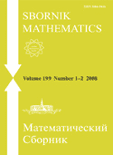
SBORNIK MATHEMATICS
Scope & Guideline
Unveiling the Depths of Contemporary Mathematics
Introduction
Aims and Scopes
- Algebra and Number Theory:
Research in this area explores algebraic structures, number theory, and their applications, including studies on prime numbers, algebraic equations, and modular forms. - Geometric Analysis and Topology:
This scope includes investigations into the properties of geometric structures, manifolds, and topological spaces, often employing tools from differential geometry and algebraic topology. - Functional Analysis and Operator Theory:
The journal publishes work related to functional spaces, operators, and their properties, emphasizing applications in various mathematical contexts. - Dynamical Systems and Differential Equations:
This area covers research on the behavior of dynamical systems, including both deterministic and stochastic systems, and their underlying differential equations. - Combinatorics and Graph Theory:
Papers in this domain focus on combinatorial structures, graph properties, and their applications in various fields of mathematics and computer science. - Mathematical Physics:
Research that bridges mathematics and physics, particularly in areas such as quantum mechanics, statistical mechanics, and integrable systems. - Numerical Analysis and Approximation Theory:
This scope includes studies on numerical methods, algorithms, and approximation techniques used to solve mathematical problems computationally.
Trending and Emerging
- Mathematical Modeling and Control Theory:
An increasing number of papers focus on mathematical models related to control systems, reflecting the importance of this area in both theoretical and applied contexts. - Computational Mathematics and Algorithms:
There is a growing trend in the development and analysis of algorithms for solving complex mathematical problems, indicating a shift towards more computational approaches. - Interdisciplinary Research:
Emerging themes often involve interdisciplinary approaches that combine mathematics with fields such as physics, biology, and engineering, showcasing the applicability of mathematical theories. - Nonlinear Dynamics and Chaos Theory:
Research exploring nonlinear systems and chaos has become more prominent, reflecting a broader interest in the complexities and unpredictable behavior of dynamical systems. - Topology and Its Applications:
There is an increased focus on topological methods and their applications in various mathematical disciplines, indicating a resurgence of interest in this foundational area.
Declining or Waning
- Classical Geometry:
While still relevant, classical geometric studies have seen less emphasis compared to more modern approaches that integrate algebraic and topological methods. - Elementary Number Theory:
Research specifically focused on elementary techniques in number theory has decreased, with a shift towards more complex and abstract algebraic methods. - Static Mathematical Models:
There has been a noticeable decline in publications centered on static models, with a growing preference for dynamic models and simulations in mathematical research.
Similar Journals

Periodica Mathematica Hungarica
Exploring Innovative Theories and Methodologies.Periodica Mathematica Hungarica is a prestigious academic journal published by Springer, focusing on the field of mathematics, with a particular emphasis on miscellaneous mathematical studies. Established in 1971, this journal has maintained its commitment to advancing mathematical research and its applications, making significant contributions over its converged years through 2024. With a Q2 ranking in the mathematics category as of 2023, it establishes itself as a vital resource within the mathematical community. Researchers and academics will find its inclusion in the Scopus database, ranking #189 out of 399 in general mathematics, indicative of its impact and relevance. Although it does not feature open access, the journal provides a wealth of high-quality peer-reviewed articles, thereby serving as an essential platform for the dissemination of innovative mathematical theories, methodologies, and findings. Engaging with the content of Periodica Mathematica Hungarica is crucial for anyone looking to stay at the forefront of mathematical research and development.
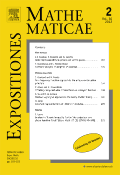
EXPOSITIONES MATHEMATICAE
Exploring Innovative Theories in MathematicsEXPOSITIONES MATHEMATICAE, published by Elsevier GmbH, stands as a significant journal in the realm of mathematics, catering primarily to researchers, professionals, and students. With an ISSN of 0723-0869 and an E-ISSN of 1878-0792, this journal has made its mark in the academic community, boasting a Q2 classification in the miscellaneous mathematics category for 2023, illustrating its prominence within its field. The journal addresses a diverse scope of mathematical topics, encouraging the publication of original research and innovative theories while maintaining rigorous academic standards. As it converges from 2004 to 2024, EXPOSITIONES MATHEMATICAE continues to be an essential resource for advancing mathematical knowledge and fostering scholarly communication, despite being a non-open-access publication. Its location in Munich, Germany further anchors it within a rich intellectual tradition, providing accessibility for the mathematical community worldwide.
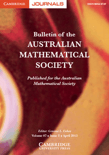
BULLETIN OF THE AUSTRALIAN MATHEMATICAL SOCIETY
Exploring the Depths of Mathematical DiscoveryBULLETIN OF THE AUSTRALIAN MATHEMATICAL SOCIETY is an esteemed journal dedicated to advancing the field of mathematics, published by Cambridge University Press. Since its inception in 1969, this periodical has fostered scholarly communication and showcased pivotal research in various domains of mathematics, now projected to continue until 2024. With an impact factor that places it in the Q2 category of miscellaneous mathematics research, it holds a notable position among its peers, ranking 215th out of 399 in the Scopus database. Though it does not currently offer open access options, the journal remains a vital resource for researchers, professionals, and students seeking to deepen their understanding of mathematical advancements. The Bulletin serves as a crucial platform for disseminating original research, comprehensive reviews, and insightful perspectives that navigate the complexities of mathematics today, ensuring the community is well-informed and engaged.
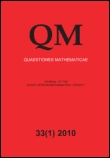
Quaestiones Mathematicae
Cultivating a Legacy of Mathematical ExcellenceQuaestiones Mathematicae is a distinguished academic journal dedicated to the field of mathematics, published by Taylor & Francis Ltd, a renowned name in scholarly publishing. Established in 1976, this journal has been a critical resource for researchers, professionals, and students alike, providing a platform for innovative and rigorous advancements in miscellaneous mathematics. The journal holds a 2023 Scopus rank of 35 out of 90 in its category, reflecting its significant contribution to the field with a 61st percentile standing, and whilst it is categorized in the Q3 quartile, it remains an essential avenue for sharing pivotal mathematical research. Although not open access, Quaestiones Mathematicae offers a rich archive of acclaimed papers, encouraging scholarly dialogue and fostering the growth of mathematical knowledge. With a converged span extending to 2024, it continues to evolve and adapt, ensuring its relevance and impact within the global academic community.

CANADIAN JOURNAL OF MATHEMATICS-JOURNAL CANADIEN DE MATHEMATIQUES
Exploring the frontiers of mathematical research.Canadian Journal of Mathematics - Journal Canadien de Mathématiques is a prestigious peer-reviewed journal published by Cambridge University Press, which aims to advance the field of mathematics through the dissemination of high-quality research articles. With its ISSN 0008-414X and E-ISSN 1496-4279, the journal plays a pivotal role in fostering mathematical research and collaboration. It has been recognized for its impactful contributions, currently holding a category quartile ranking of Q2 in Mathematics (miscellaneous) for 2023 and sits in the 66th percentile among its peers according to Scopus rankings. As the journal continues its convergence from its inception in 1994 through to 2024, it remains a vital resource for researchers, professionals, and students seeking to stay at the forefront of mathematical developments. The journal does not operate under an open access model, allowing for a curated collection of articles that adhere to rigorous academic standards.

COLLOQUIUM MATHEMATICUM
Elevating mathematical discourse from Warsaw to the world.COLLOQUIUM MATHEMATICUM, published by ARS POLONA-RUCH, serves as an essential platform for the dissemination of innovative research in the field of mathematics. With an ISSN of 0010-1354 and a dedicated E-ISSN of 1730-6302, this journal plays a crucial role in advancing mathematical knowledge and fostering collaboration within the academic community. Although it is categorized in the Q3 quartile for miscellaneous mathematics, its content consistently attracts a diverse readership, reflecting a wide array of mathematical disciplines. Spanning publication years from 2001 to 2009 and resuming from 2011 to the present, *COLLOQUIUM MATHEMATICUM* offers researchers, professionals, and students the unique opportunity to engage with groundbreaking concepts and methodologies. With its home base in Warsaw, Poland, this journal not only contributes to the regional mathematical landscape but also impacts the broader global community. While currently not adopting an open access model, the journal remains committed to quality research, evidenced by its Scopus ranking within the general mathematics category. Engage with *COLLOQUIUM MATHEMATICUM* to be at the forefront of mathematical exploration.

TRANSACTIONS OF THE AMERICAN MATHEMATICAL SOCIETY
Fostering Innovation in Mathematical Theory and ApplicationsTRANSACTIONS OF THE AMERICAN MATHEMATICAL SOCIETY, published by the American Mathematical Society, is a premier journal in the field of mathematics that has been contributing to the advancement of mathematical knowledge since 1900. With an ISSN of 0002-9947 and an E-ISSN of 1088-6850, this journal holds a prestigious position in the academic landscape, evidenced by its Q1 rankings in both Applied Mathematics and Miscellaneous Mathematics categories as of 2023. With a Scopus ranking of #97 in General Mathematics and a percentile standing of 75th, the journal is recognized for its rigorous peer-review process and the quality of the research it publishes. Though it does not currently offer open access options, it essentially serves as a vital resource for researchers, professionals, and students seeking critical insights and developments in mathematical theory and applications. The Transactions aim to publish high-quality research articles that foster the exchange and dissemination of ideas, supporting the growth of both theoretical and applied mathematics within the global scholarly community.

Ukrainian Mathematical Journal
Advancing Mathematical Frontiers Since 1957The Ukrainian Mathematical Journal is a prominent academic publication in the field of mathematics, focusing on a diverse range of topics that appeal to researchers, professionals, and students alike. Published by Springer, this journal has been an important platform for disseminating significant mathematical research since its inception in 1957. With the aim of fostering knowledge and collaboration within the mathematical community, the journal curates high-quality articles that meet rigorous scholarly standards, evidenced by its Q3 ranking in the miscellaneous mathematics category for 2023. Although it currently does not offer open access, the journal remains accessible through various institutional subscriptions. It serves as a vital resource for ongoing discourse in the field and invites contributions that further advance mathematical understanding.
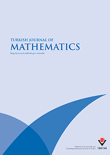
Turkish Journal of Mathematics
Innovating Solutions through Quality ResearchTurkish Journal of Mathematics is a prestigious academic publication dedicated to the advancement of mathematical research across a variety of subfields. Established in 1995 and published by the Tubitak Scientific & Technological Research Council Turkey, this journal has built a solid reputation, especially noted for its significant contributions to the field over the years, with its convergence spanning from 1995 to 2002 and again from 2006 to 2024. The journal, which holds a commendable Q2 ranking in Mathematics (miscellaneous) and is positioned in the 66th percentile of Scopus rankings for General Mathematics, aims to disseminate high-quality original research, reviews, and innovative methodologies to advance both theoretical and applied mathematics. Researchers, professionals, and students alike will find invaluable resources within its pages, providing insights that are pivotal for academic and practical applications in mathematics. Although it does not currently offer open access options, the journal remains an essential platform for those looking to engage with the forefront of mathematical inquiry.

St Petersburg Mathematical Journal
Cultivating Insights in the Heart of MathematicsSt Petersburg Mathematical Journal, published by the American Mathematical Society, is a distinguished platform that fosters research and discourse in the fields of mathematics, specifically focusing on Algebra and Number Theory, Analysis, and Applied Mathematics. With an ISSN of 1061-0022 and an E-ISSN of 1547-7371, this journal has been a reliable source of cutting-edge mathematical research since its inception in 2003 and continues to publish high-quality content through 2024. Although not open-access, it offers valuable insights and advances the mathematical community's understanding, as indicated by its respectable impact factor and Scopus rankings across various categories—landing in the Q3 quartile across three significant mathematical disciplines. Researchers, professionals, and students are encouraged to contribute and engage with this journal, as it remains a vital resource for promoting collaboration and discovery within the ever-evolving field of mathematics.